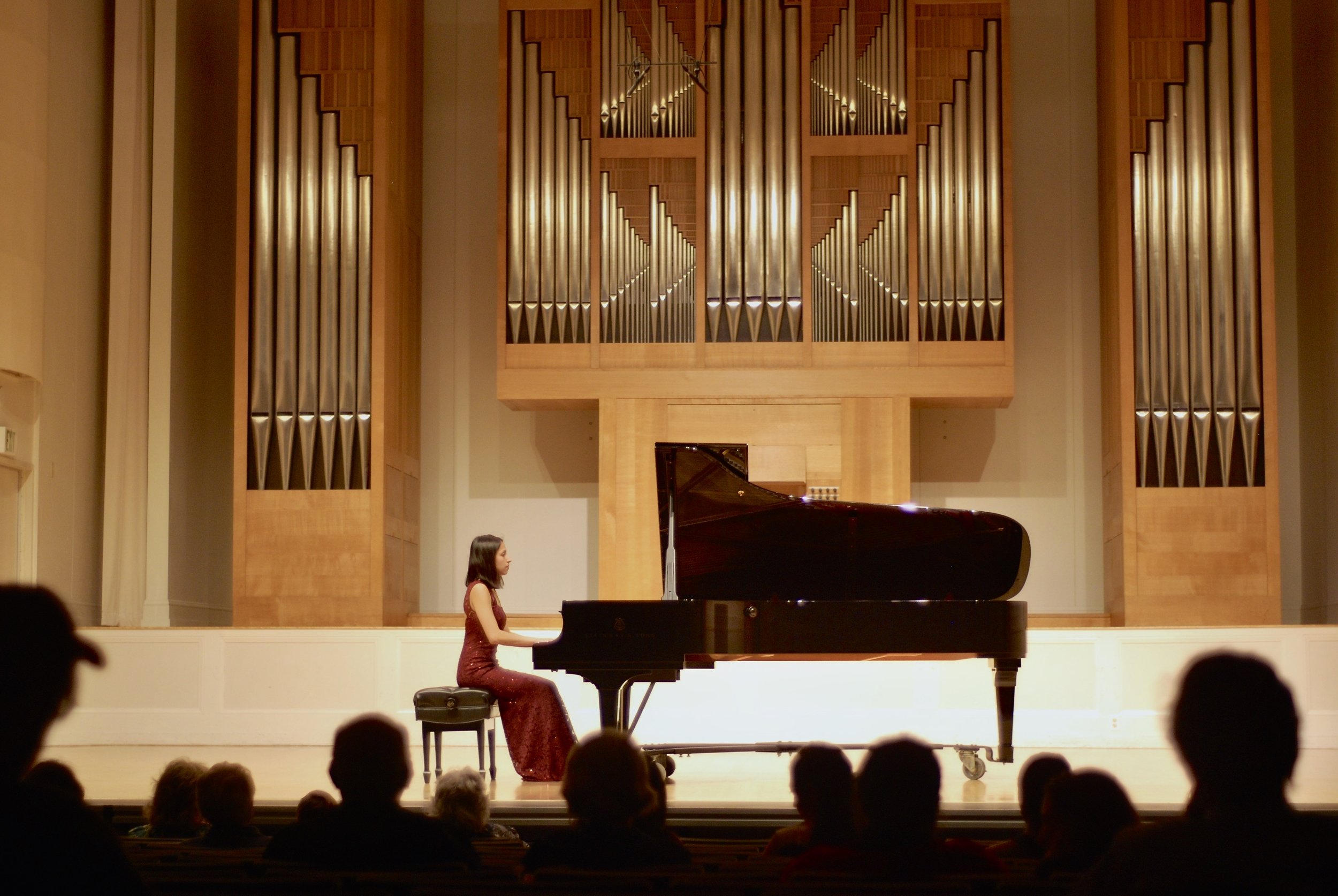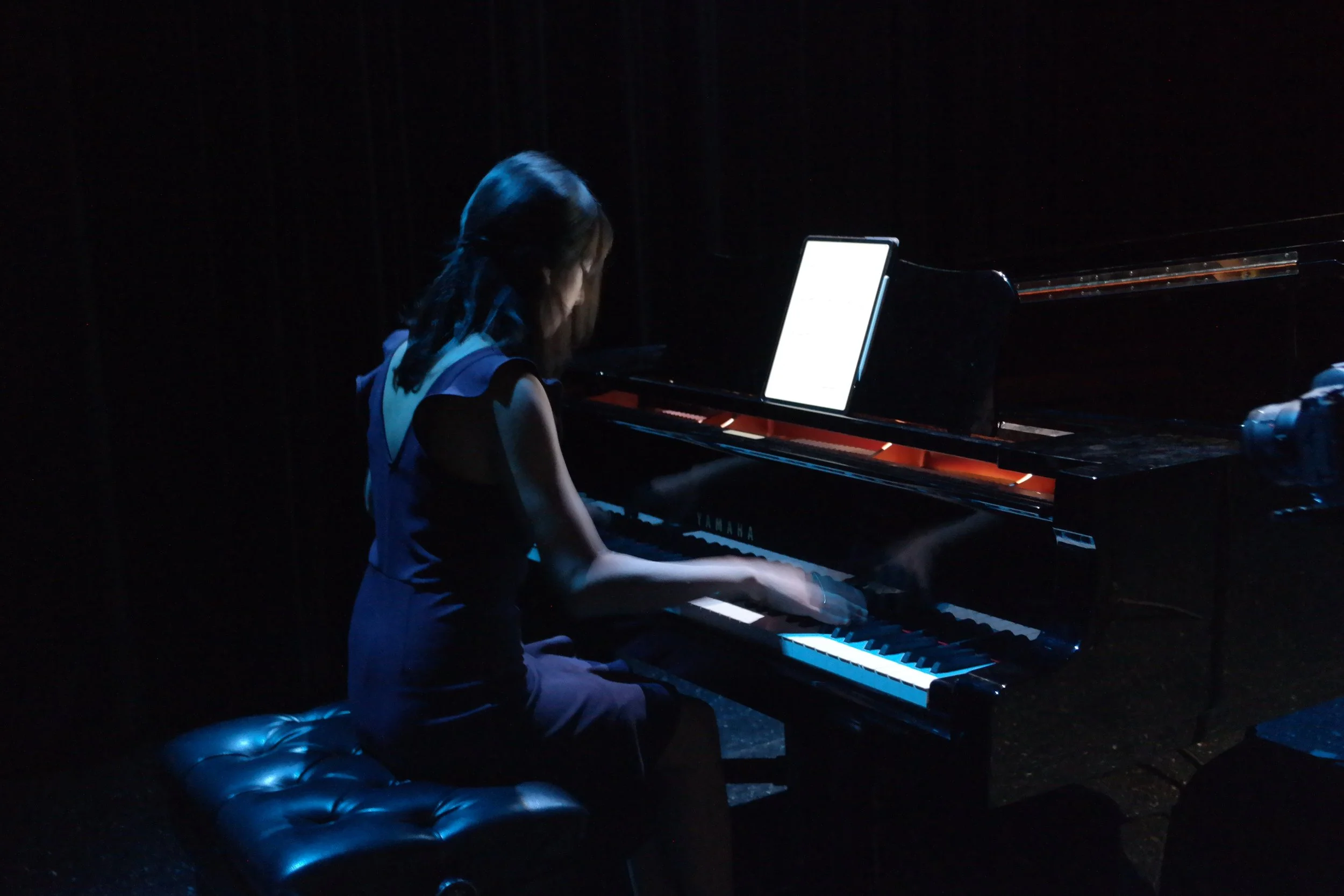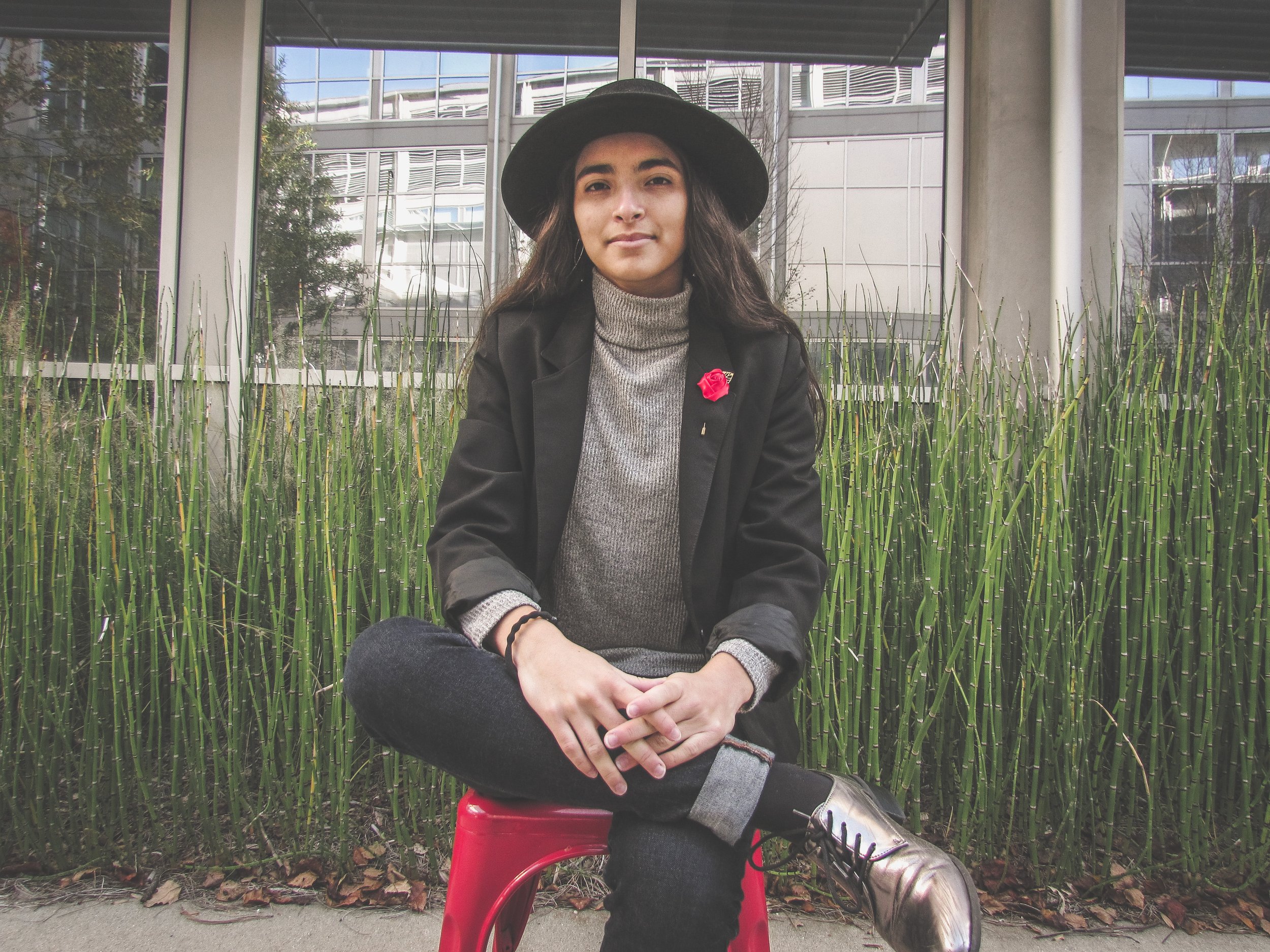
Identity Through Sound
ABOUT THE PROJECT
Identity Through Sound is a project conceived and performed by pianist Zaira Castillo that showcases how identity and upbringing can be inspiration to composition. For the project, Castillo commissioned new works from composers Claudia Beroukhim, Pedram Diba, Caitlin Santos, Ayako Pederson Takeda, and Christopher Hernandez. Castillo’s performances of the works were filmed and embedded into a documentary highlighting the personal stories of each of the composers. The videographers are Lodi Castillo (documentary) and Andrew Collins (musical works). Casey O’Neil is the recording engineer/producer.
“Identity Through Sound” was made possible by a 2020 Graduate Research Award from UGA’s Willson Center for the Humanities as well as an ArtsLab Fellowship from the University of Georgia, awarded to Zaira Castillo in 2021-22. Additionally, this project would not have been possible without the constant support and mentorship of Dr. Liza Stepanova.
ARTIST STATEMENT
In October of 2020, I initiated a call for scores inspired by my aspirations to perform the music of underrepresented living composers. In January 2020, my vision for the project altered after being awarded a generous grant through the Willson Center for Arts and Humanities at the University of Georgia. This grant enabled the expansion of my project to include documentary videos about each composer entailing their upbringings navigating the world of music and composition as people of color. The project enabled close collaboration with five BIPOC composers through the realization and premiere of five new works for piano. By understanding the unique perspectives behind each composer’s piece, we can further reflect on the importance of self-expression through composition.
The process involved workshops and rehearsals with all five composers over the course of Fall 2021. These workshops served to enable specific nuances and ideas to be shaped in what they envisioned for their final recording. Unlike the performance of standard classical repertoire, modern contemporary music allows for the unique collaboration between the performer and composer.
The premiere of this event contradicts the traditional concert performance venue. The premiere will take place in downtown Athens at Ciné as part of the Spotlight on the Arts Festival. Instead of creating a live performance experience, the five solo works and documentaries will be presented as a premiere screening. The venue location and accessibility hopes to attract a diverse audience from the Athens community and university.
This project hopes to inspire conversations around the need to showcase more music of underrepresented people, especially those in the classical contemporary field.
— Zaira Castillo
ABOUT THE MUSIC
Alight for solo piano (2021)- Christopher Hernandez
The basic premise of “Alight” can be divided into three sections with each representing a different time in the composer’s musical and cultural journey. In the beginning, there was that discovery of how one felt listening to certain songs, feeling certain emotions. This was semi-influenced by the composer’s musical background, which was rooted in genres such as bolero, jazz and Latin pop.
As the piece develops into more hectic territory, the composer puts into focus the sense of assimilation to American culture. Though the main texture may insinuate a resolution towards the end of the section, it ultimately serves as a false victory in absolutism.
However, in the piece’s final section, the texture becomes more ambiguous, the lights more blurry, the night more obscure. This is where I find myself through developing my sense of cultural identity, being not fully one thing, but not fully another. This is the product of both. As a result, a wistful notion among the keys encompasses this journey in its arms and gives it purpose. This is Alight.
R(apt)ure (2021) for piano and narrator- Ayako Pederson-Takeda
The spoken text is a combination of a quote and various anecdotes from my life. The first and last movements include a quote from poet Warsan Shire, and the inner movements each include a different experience I have had regarding my name. These are all extremely personal stories of mine, and when listening to this piece, I ask that the listener reflects on the importance of difficult names.
For it is Our First Universe (2021) for piano and electronics-Pedram Diba
The conceptual framework of this piece is taken from Gaston Bachelard's book "Poetics of Space". In this book he talks about the intimacy one develops toward the space of their childhood home, and how that intimate relationship becomes a fundamental part of that person. The title of the work was constructed by putting two quotes from Bachlard’s book together. The concept of home could also be applied to many more things beyond the house itself. It could be applied to home town, home, country, the language one grows up with, and even the cuisine one grows up with.
In “For it is Our First Universe” I used phonographies of a bazaar in Kerman to make the electronics as well as forming the instrumental part. I chose to record sounds in the bazaar of Kerman because it is one of the biggest and oldest bazaars in Iran with mesmerizing architecture, which contributes to its historical significance. Additionally, the space and sounds of a bazaar have strong intimate significance for anyone who grows up in Iran. The bazaar of Kerman has an even stronger sense of intimacy for me since I am familiar with its space as well as the accent of people as a result of growing up in Kerman.
Lastly, the sense of intimacy towards a space also exists in the bazaar itself. The design of the bazaar allows each vendor to have their very own space, where no one else can enter. As a result, all vendors develop a sense of intimacy toward their space in the bazaar.
Eazy Burdens (2021) for solo piano - Caitlin Santos
As the daughter of two parents who spent most of their lifetime in New Orleans, it has always been a city that has been near and dear to my heart. Growing up, going to New Orleans meant visiting family, catching beads in the Mardi Gras Parades, shouting “Who Dat!” and of course, eating delicious foods. Looking back, I recognize that despite all the joys and fun, there was always an underlying burden that weighed heavy on the ‘Big Easy.’ That burden being the inevitable destruction of Hurricanes. Such a burden that has become so ingrained into the culture that is New Orleans.
The realization did not arrive overnight, in fact, several of the notable hurricane’s such as Katrina and most recently, Laura, never really phased me. It wasn’t until I was in the middle of writing this piece that I realized the severity and potential of a storm's might and how it can brutally affect communities. When Hurricane Ida was preparing to make landfall in Louisiana this past August, I immediately fell into a spiral of pressing questions like: What’s going to happen? Will my family be okay? And what if this is really bad? Such disarray left me in a constant state of fear and concern because I knew that there were still cities that have not fully recovered from storms that took place over two years ago. What could such a force do this time?
As a way to cope, I scraped my original concept and decided to write a piece that would feature different stages of a storm and its effect on the community: before, during, and after. This contemporary jazz-influenced piece pays tribute to the state of Louisiana and its people who have endured and conquered the burdens of hurricanes.
Rhapsody for a Home (2021) for solo piano- Claudia Beroukhim
This piece is a musical telling of stories that explore the varied feelings and experiences that have come from my life and identity. It is an ongoing story of confusion, excitement, inner conflict, and acceptance as I have grappled with being a first-generation American, born and raised in the south to a Jewish-Iranian family. My experience comes with its own set of challenges, but it is also one that is shared by many as we hope to feel seen and search for a sense of belonging that feels like “home”. All movements of this piece are connected, one leading into the next. The piece begins with a sweet and tentative theme that feels a bit lost, yet hopeful, which leads into a heavier theme full of clusters and ambiguity, unsure of where it will go next. There begins to be a floating feeling and distance from reality towards the end of this section and into a minimalist, dream-like sequence, signaling a transition almost into an alternate world. This next section is a little taste of Persian culture that is dance-like and joyful. The tune unravels though, leading into a spacious and misty section that foreshadows a metaphorical storm that will soon erupt. As tension builds, there is a fleeting quality to the music driving towards a harsh, inevitable climax. The dream-like section returns, but is slightly changed and leads to the opening theme once again. There is a sense of closure and acceptance as the opening theme is altered but remains the same at heart, grateful for this journey.

AARI Feature: A Preview with the Composers
Concert Review
“Once the last performance ended, Castillo and the five composers were met with a standing ovation from the audience. Soon after, the floor was opened for questions about the project". -Bass







